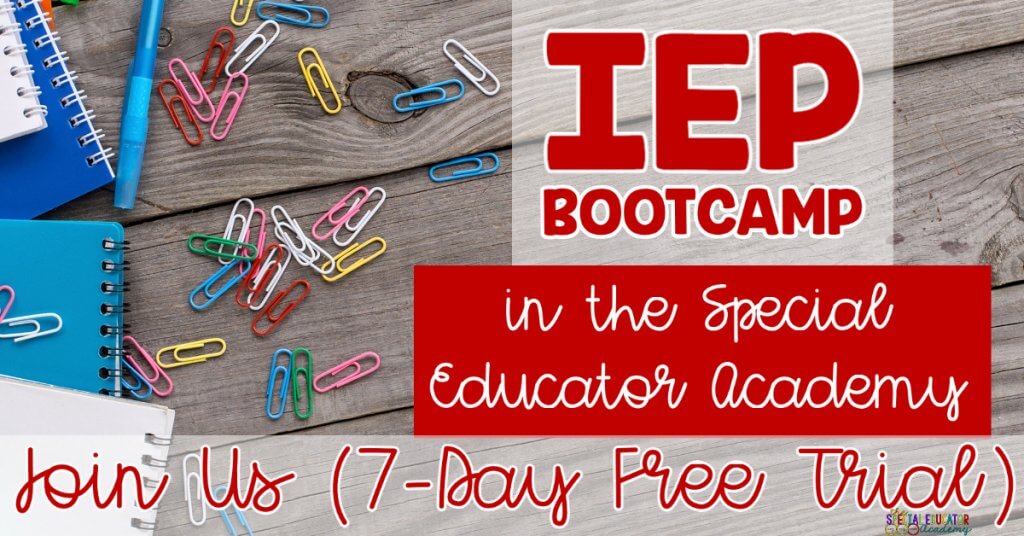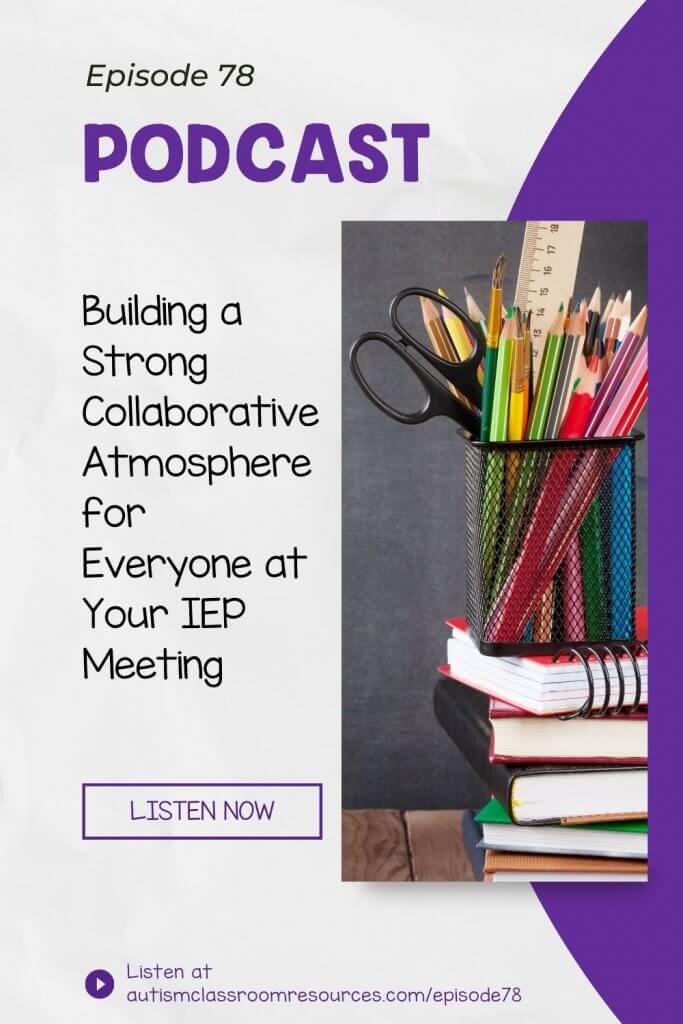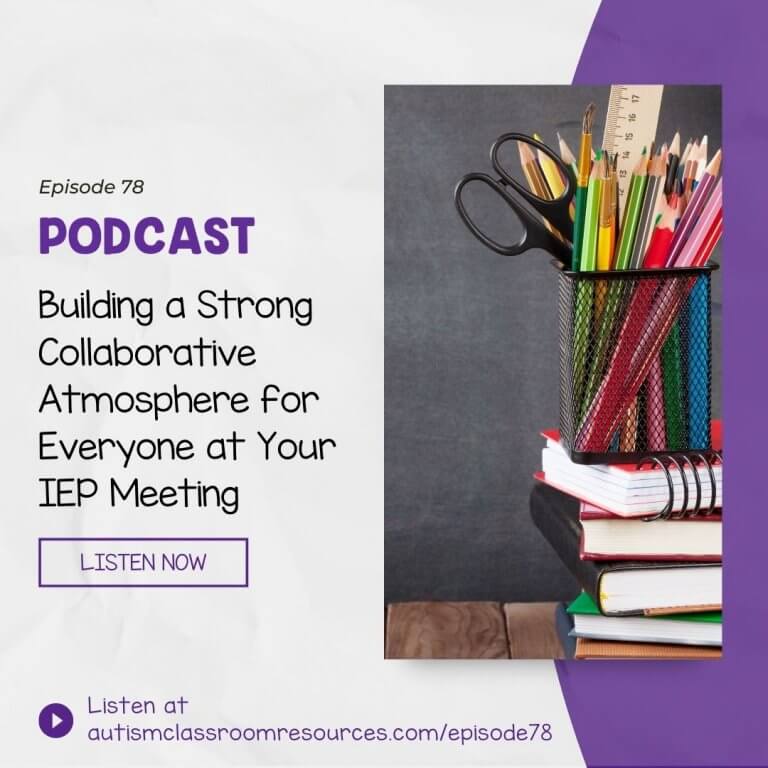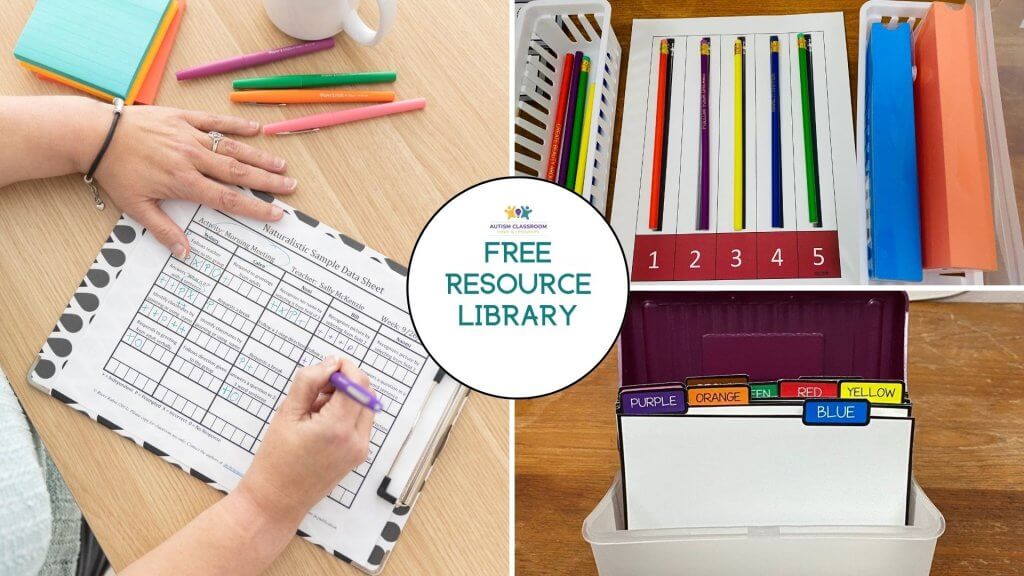Welcome to the Autism Classroom Resources Podcast. The podcast for special educators who are looking for personal and professional development.
I’m your host, Dr. Christine Reeve. For more than 20 years, I’ve worn lots of hats in special education, but my real love is helping special educators like you. This podcast will give you tips and ways to implement research-based practices in a practical way in your classroom, to make your job easier and more effective.
Hi. Welcome to the Autism Classroom Resources Podcast. I’m Chris Reeve and I’m your host, and I’m very glad you’ve joined us today. We are continuing to talk about IEPs and how much we love or don’t love them. And so I’m going to start today with a social narrative that’s actually written for the IEP team, because I am going to focus on collaboration today. And so I want to talk a little bit about perspectives.
So let’s start with a story about collaboration. An IEP is a meeting of parents and professionals who work together to plan an educational program for a student. In order to plan a program for a student, all the participants have to collaborate. Collaboration means that they work together to meet a common goal. When people collaborate with each other, they want to develop ideas and plans that are better than they could have developed on their own.
When an educational team collaborates, everyone comes to the meeting with a different perspective. The parent or family’s focus in the meeting is their child. They are worried about what is best for their child. The teacher is also concerned about the child, but they also have to think about the rest of their class. The principal is concerned about the child, but they also have to worry about all the other students in the school and the wellbeing of their teacher. The special ed director is concerned about the child, but they also have to consider all the other students who receive special ed services in the school district.
Sometimes, when people have so many different points of view, they disagree about what they should do. Sometimes disagreement is productive. Sometimes disagreement causes people to be uncomfortable and upset. If I get uncomfortable or upset, I will try to remember that everyone has a different point of view and I will visualize the student learning from their educational program. When we all stay calm and work together, we can create a program that is better than any program we could create alone.
Okay. It sounds a little pie in the sky and I know it sounds a little juvenile, but that is, after all, what we’re trying to achieve with an IEP. And it is, indeed, the perspective that everyone is coming to the meeting with. And I think it’s important that we recognize that everybody has a different perspective and there’s value in that. There’s value in the fact that we’re not all coming from the same point of view. We all have different skills, we all have different knowledge, we all have different knowledge of the student and we have to come together and put all that knowledge together to create a program that is going to work for this student.
And so today, I’m going to share some tips on how we can do that and how we as educators, in particular, can facilitate that process and help it to go smoothly. So let’s get started.
So in thinking about collaboration, I think a few things that we need to think about first as educators in particular. And that is that parents and students have the biggest stake in this process. They are the ones whose lives we are affecting. They are the ones with the lifetime outcome here. So I think it’s important that we take a moment and think about some of the obstacles for them in the IEP process. So obviously, for us as educators, the paperwork is overwhelming, it’s even more overwhelming for families, because they don’t necessarily get any kind of training. We’re not always really good about training them in what it means. They often are getting a lot of information presented to them in what we might call education speak legalese, instead of talking about their child. Many times they’re hearing this information for the first time.
So imagine coming into a meeting in which you’re outnumbered, just in the sheer number of people who come to an IEP meeting. Hearing all these words and jargon and language that you don’t understand, you don’t know what it means, you don’t know how this process works. You’re seeing people pay attention to paper, you’re having a hard time knowing when you are supposed to give your opinion, you don’t know the order in which we go through this process. Computers and the way that we electronically deal with things now may make things go even slower. All those kinds of things can be very intimidating for a lot of our families. And many of them are convinced, before they ever walk in the school door, that they’re going to have to fight in order to get what they think is appropriate for their child.
Now, whether that comes from a previous experience at another school or at your school or a previous school in your district or a district far, far away, in another galaxy, doesn’t really matter. Or whether they’re brand new to school and they’ve never even been at a school district at all. Many of them are prepared to fight before they ever come in. And that is where they’re coming from, that’s what they have been prepped for. And we have to take that into account.
One of the things that also happens is that many times they come in and we are not always very good about being respectful about their expertise about their children. These are the people who live with these kids. They know them better than anybody else. And I think one of the things that the pandemic really opened was the idea that, and I think we all got a good look at what kids look like at home that maybe we hadn’t seen before and they got a good look at what kids might look like at school that maybe they didn’t see before. So I think it did open and maybe lift some of those barriers. But there are a lot of issues that they are dealing with that we aren’t always aware of.
So I think that we have to be aware that they often feel very alone in this process. And we need to take special care about informing them of how the process is working. Now granted, there are families that are pros at this, that can run the meeting better than you can, but the majority of our parents aren’t those parents.
So teachers are coming and going, general education teachers, they don’t know why they’re there, all those kinds of things. So I think that we really have to work double time to help our families have a chance to talk about what’s going on, to make sure that we’re listening to them, to make sure we’re giving them an opening to speak and things like that. So I think that’s one key element we have to focus on.
So I think it is really important that we focus on understanding everybody else’s perspective in the meeting and that we take the time to help families feel comfortable in the meeting that we stop and we ask them if they have questions, that we stop and we ask when we see that they’re looking a little confused, that we give them that.
But also there are ways that we can help them feel more comfortable just in the way that we act. So one way is to do what you might call avoid the corporate culture. That us against them. That can be something as simple as not setting up the rooms so that it’s all the school on one side of the table and the family on the other side of the table, which automatically sets that up. But it’s also making sure that the team feels encouraged to share what they think, making sure that teachers know how to advocate effectively, and I’ll be doing an episode about how to do that effectively. It’s about making sure that we’re talking about the student and not the program. That we’re not saying, “This is what our program does,” but saying, “This is who this student is, and this is what he needs.” Because remember, we’re there because of the student and we have to keep the student at the center of what we do. We have to worry about the student, we have to take the parent’s perspective.
Another thing we need to do is to try to avoid what we call don’t commit assumicide. When a parent is late or a no-show, we might assume that they don’t care, that they’re not invested in their child’s education. When in fact, it may just be that like us, their car broke down or other things were getting in the way or they couldn’t get away from work or a million other things that happen to us. That when they’re asking for documentation, that they’re trying to catch us in something that we’re doing wrong, might be what we assume when in fact it’s just, “I need to see it because I’m not a good auditory learner,” right? “I do better when I see things.” When they’re recording an IEP meeting, it might just be that maybe they can need to be able to go over it later, to be able to figure it out.
When they bring an advocate to the meeting, many times, we assume that that means that they’re ready to sue us when really, that just means, “I need somebody on my side to be another set of ears for me,” just like I often will take a family member to a doctor appointment that’s really important. I need somebody else to hear what he has to say.
And just to be even-handed about that, it goes both ways, we need each of us to share perspectives. When schools say that they don’t think that a student needs a service, many times families think that the school is saying, “It’s too expensive and we can’t do that,” when in fact, many times it is that they truly do not think that’s an appropriate service for that student. When a school says that the child is making progress, sometimes the family feels like, “Well, you’re just saying that so you don’t have to provide more services,” when in fact, sometimes they truly feel that that is the case. When the school isn’t able to get a draft to the family fast enough, sometimes the family feels like, “You’re trying to hide something from us.” And in fact it just is that we just had way too much to do.
So you can see that from our perspective we know that those things happen for us, that keep us from doing those things that families might assume something, the same goes in the other way around. When we have to end meetings before we finish them, families may assume that we’re trying to avoid that showdown of discussion when in fact it is that, “I really have to pick my child up from daycare or I’m going to be fined.” So we have to think about those things and it goes both ways.
So it’s very, very important in the collaboration process that we make sure that we’re putting ourselves in each other’s shoes and we’re trying to take the perspective of each other. Everybody is coming with different perspectives. That brings positives. We all have a different viewpoint, we can come up with better solutions, but we have to be willing to work together to make that happen. And that means that we have to listen, that means we have to try to be impartial, that means we have to try to reflect back, to summarize, to watch as much as we listen so that we come and say, “I see from what you’re looking like, I think you have a question. Can you tell me what you’re thinking? You’re looking like maybe you’re confused or I’ve said something that you’re not quite clear on. Can I clear anything up for you?” So we want to be able to follow up with those kinds of things.
And I think it’s also important to recognize, and I’ve talked about this before, don’t be intimidated by those questions. And if you’re not committing assumicide, if you’re stepping back, do some square breathing, do some calming strategies, remember that when families ask questions like what are your qualifications? They’re not doing a “got you.” They honestly want to know who’s taking care of their child, just like you would want to know that for your own child.
So think about those things this week. I would love to hear what you think about these issues and the other things that you think are important in going into an IEP and how you collaborate effectively. So if you’re an educator hop over to our free Facebook group at specialeducatorsconnection.com, answer the quick questions and we will make sure to get you in there and join our discussion about that.
And if you are looking for more information about collaboration and making IEPs run smoothly and writing IEPs, come join IEP bootcamp. We have it running this summer and we have an ongoing course that will help you get your IEP goals written so they make your life easier in the classroom and then help you implement them effectively through your classroom design. And you can get a seven day free trial at specialeducatoracademy.com, and I would love to see you there. Thank you so much for listening. Thank you for everything that you do for your students. And I hope I see you again next week for another episode.







